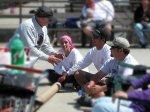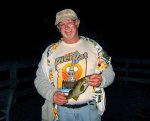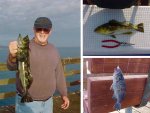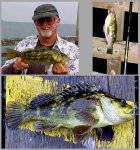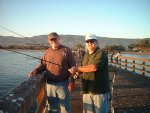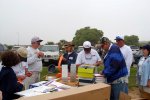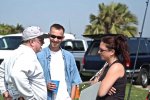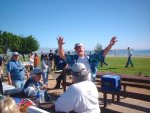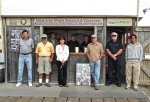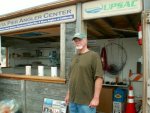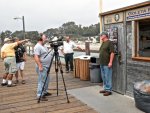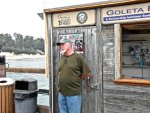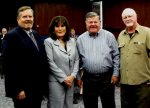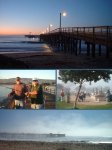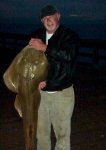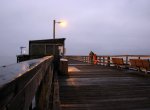A Tribute to Boyd Grant — Pierhead (Part One)
Rest In Peace My Friend — Boyd Grant aka Pierhead
Rest In Peace My Friend — Boyd Grant aka Pierhead
“There is more to fishing than catching... slow down and enjoy the whole of creation. You only go around once.”


Those words well describe Boyd Grant’s outlook on life and though he was hard working, dedicated to many different causes, and unflinching in his search to improve the environment, he also took the time to sit back and enjoy the world around him.
Most special I think was the time he spent at the Goleta Pier and the times he could sit back and simply enjoy the scenes at the pier. The excitement of a large fish or the mystery involved when an unknown species was pulled up to the pier. The always interesting visits to the pier’s waters by the cetaceans, the dolphins and whales. The funny antics of the sometimes too intrusive pelicans and the not-so-funny sea gulls and cormorants.
Sometimes it was the people, the lovers strolling hand in hand out to the end of the pier, sometimes those young and fresh on the journey, sometimes the elderly who had survived the journey. At times it was the joy of watching fellow anglers. A child’s first fish, a friend’s prize catch, or the shared frustration when the “fish just weren’t biting.”
Sometimes it was something as simple as the beautiful sunsets that could provide a spectacular end to a long day at the pier. Santa Barbara, Goleta and the Goleta Pier—it’s not a bad area to spend a few days—or years.
In 1997 I began the Pier Fishing In California website, a site much more simple than that seen today. It didn’t even have a message board but I did try to post monthly pier reports. An early question for those who watched the site was help with the monthly reports — I needed some local reporters.
Then, on July 4, 1997, I received the following Email from Boyd: “Thank you for capturing in words so many of my impressions from almost 50 years of fishing that historical pier. My father first fished the wharf with his father before 1920... By the way—I'm 53—I started fishing the Wharf when I was 5. And yes, I still fish one of the local piers at least once a week. For the past 7-8 years I fished Goleta exclusively trying to recapture the morning when I took 3 10#+ shovelnose sharks off the west side 3/4th of the way out. I was using 20# mono and anchovy cut bait, casting out over the kelp (which follows the outfall line). Apparently they were congregating there (late spring) and for weeks I had been taking 3-4 pounders. I got 13#s of tail meat. Goleta hasn't been too hot this year so I went back to the wharf starting 3 weeks ago—my first day (in search of some action ... ANY action!) resulted in 16 small (9-11") calico bass, 2 mackerel, 1 small shovelnose, 2 white croakers and a senorita fish. I've been there 4-5 more times since and the calico and mackerel action has been consistent. That first weekend a woman tourist snagged a baby whale that took out several hundred yards of line before it surfaced and the line broke—maybe it was 15’ long. By the end of the day it had become (for her) a 30’ blue whale. Guess it just goes to show any fish, no matter how big, can always stand some exaggeration.” Boyd.
That Email message was only the first of literally hundreds (if not thousands) of messages over the years. And, it would begin a friendship that lasted more than two decades.
PFIC did eventually get a message board and an early discussion concerned Boyd and his residence on “Pier Street” in Carpinteria. His friend Sinker said, “You gotta love being a pier fisherman and living on Pier Street.” His friend Gordo Grande said “That's just too cool!!!!!” And everyone seemed to want to live on “Pier Street” (I know I did). Meanwhile Boyd decided to give he and his friend GreenRag the name “Pier Street Irregulars.” It just all seemed right.
And though the messages continued, they evolved into much more than simple fish reports. Adopting the screen name Pierhead, Boyd became one of the most valued and respected members of the Pier Fishing In California family. His reports were accurate, his comments insightful, and his advice generally heeded. They reflected his beliefs on how the pier environment could be improved and provided useful suggestions on how to actually make the improvements.
He was part of the early group that helped shape the ethos of PFIC. It was a group that not only stressed the joy and value of recreational fishing, both for individuals and family, but it also brought into play the ethical approach that angler’s should apply to the sport—and Boyd was a leading exponent of that view.
His ideas provided me with insights on Boyd’s philosophy of life and helped me gain an appreciation for Boyd as a person, one who was willing to “make the walk as well as talk the talk.”
For myself, looking back on our collaboration over the years, I can see that although I often did most of the writing and the talking (he preferred to take a behind the scenes approach), much of the message came from Boyd. I would have an idea, call Boyd, and generally he would offer new, different or additional insights that I hadn’t considered. Early on that collaboration resulted in “The Pier Rats Code” which is still posted on PFIC to this day.
The Pier Rats’ Code
As responsible anglers, we recognize that our actions should always be governed by what is right—ethically and legally—and we understand and agree that the best ways to accomplish our goals is through personal example and education.
We’re dedicated to preserving the pier rats’ environment in the following ways:
We will work to protect all species of fish. Fish that will be kept for food will be killed in a humane manner. Fish that are to be returned to the water will be handled with care in an attempt to assure their safe return to the water. All species of fish—both sportfish and incidental species—will be given the same respect and treatment. We will attempt to avoid the capture of unwanted or prohibited species.
We will work to improve the environments of the piers themselves as well as the waters around the piers. We will dispose of trash in trash containers, make sure there are no lines or discarded tackle on the pier, and clean up bait from the surface of piers as well as the railings. Where possible, we will assist in the removal of lines and tackle from pilings and pier structures. We will not throw pollutants (of any type) into the waters adjacent to the pier. We will always try to leave the pier as clean or cleaner than when we arrived.
As guardians of the pier environment, we will, to the best of our ability, try to reason with and correct anglers observed to be acting in a manner detrimental to that environment. We will, if necessary, report cases of abuse to the relevant authorities. Observations of illegal fishing methods will be reported to the Fish and Game Department (CalTip). Observations of destruction to the pier will be reported to local agencies.
We will encourage good fishing etiquette. We will learn and obey all fishing regulations. We will treat fellow anglers with courtesy and respect. We will endeavor to educate our fellow anglers in sound and safe angling methods and fishery conservation.
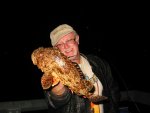
The code reflects an ethical approach to angling and though written by me reflects Boyd’s philosophy and outlook toward fishing in every paragraph. I think it also reflects Boyd’s even larger views about life and leading one’s life in an ethical manner.As responsible anglers, we recognize that our actions should always be governed by what is right—ethically and legally—and we understand and agree that the best ways to accomplish our goals is through personal example and education.
We’re dedicated to preserving the pier rats’ environment in the following ways:
We will work to protect all species of fish. Fish that will be kept for food will be killed in a humane manner. Fish that are to be returned to the water will be handled with care in an attempt to assure their safe return to the water. All species of fish—both sportfish and incidental species—will be given the same respect and treatment. We will attempt to avoid the capture of unwanted or prohibited species.
We will work to improve the environments of the piers themselves as well as the waters around the piers. We will dispose of trash in trash containers, make sure there are no lines or discarded tackle on the pier, and clean up bait from the surface of piers as well as the railings. Where possible, we will assist in the removal of lines and tackle from pilings and pier structures. We will not throw pollutants (of any type) into the waters adjacent to the pier. We will always try to leave the pier as clean or cleaner than when we arrived.
As guardians of the pier environment, we will, to the best of our ability, try to reason with and correct anglers observed to be acting in a manner detrimental to that environment. We will, if necessary, report cases of abuse to the relevant authorities. Observations of illegal fishing methods will be reported to the Fish and Game Department (CalTip). Observations of destruction to the pier will be reported to local agencies.
We will encourage good fishing etiquette. We will learn and obey all fishing regulations. We will treat fellow anglers with courtesy and respect. We will endeavor to educate our fellow anglers in sound and safe angling methods and fishery conservation.

Without Boyd we may never have started United Pier and Shore Anglers of California (UPSAC) in 2003. His ideas, support, and sometimes prodding were invaluable in moving the organization from a “thought” into reality. And once started, his time on the Board of Directors for over a decade, helped shape the organization given his ideas and direction. He offered up valuable insights time after time.
Without Boyd UPSAC may not have obtained a grant from the Channel Islands Marine Sanctuary Foundation and been able to develop and give the educational classes at Goleta Pier (Goleta Pier—A Learning Platform).
Without Boyd we would never have had the outstanding “Get Togethers” that took place in Goleta in 2003, 2004 and 2005.
Nor would we have had the amazing “Get Togethers” that began at Avalon on Catalina Island in 2003.
